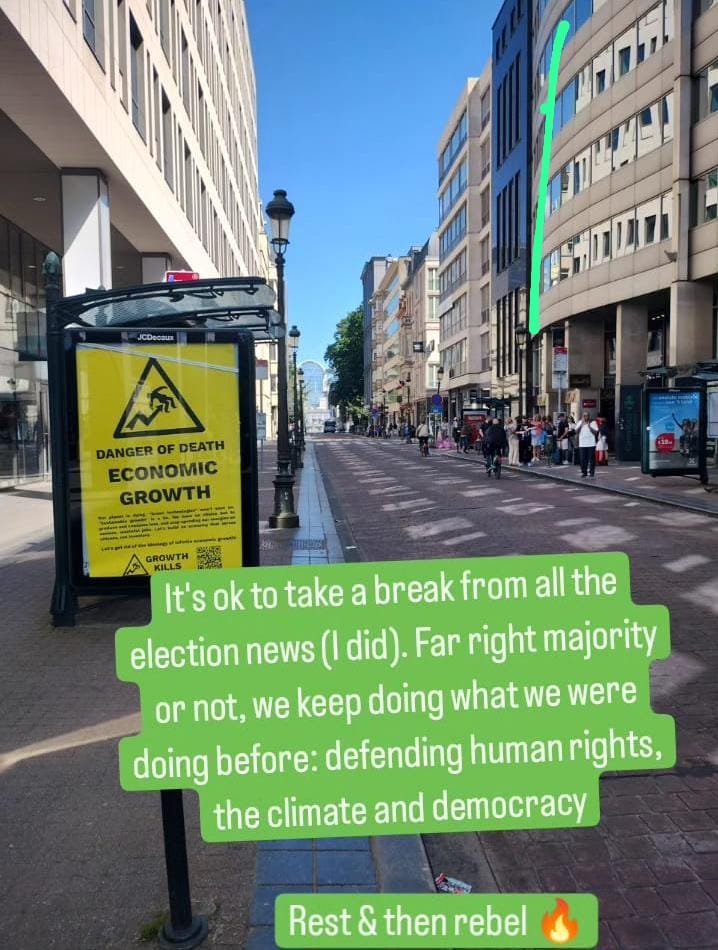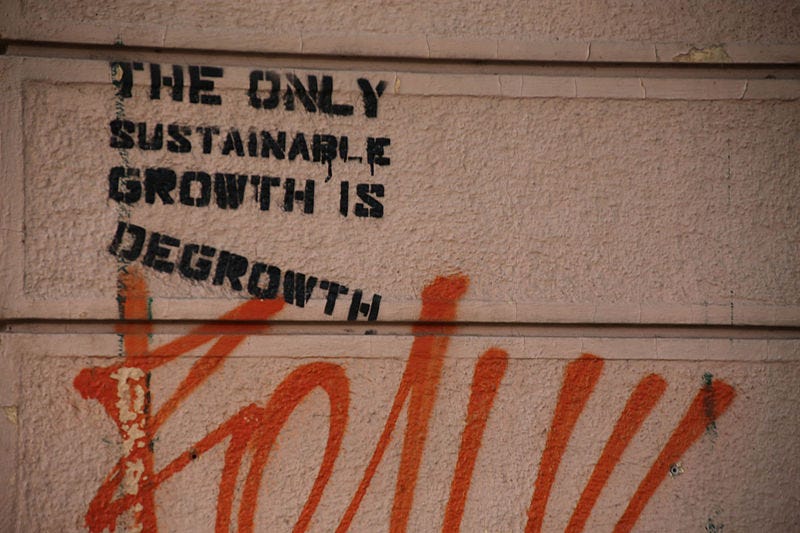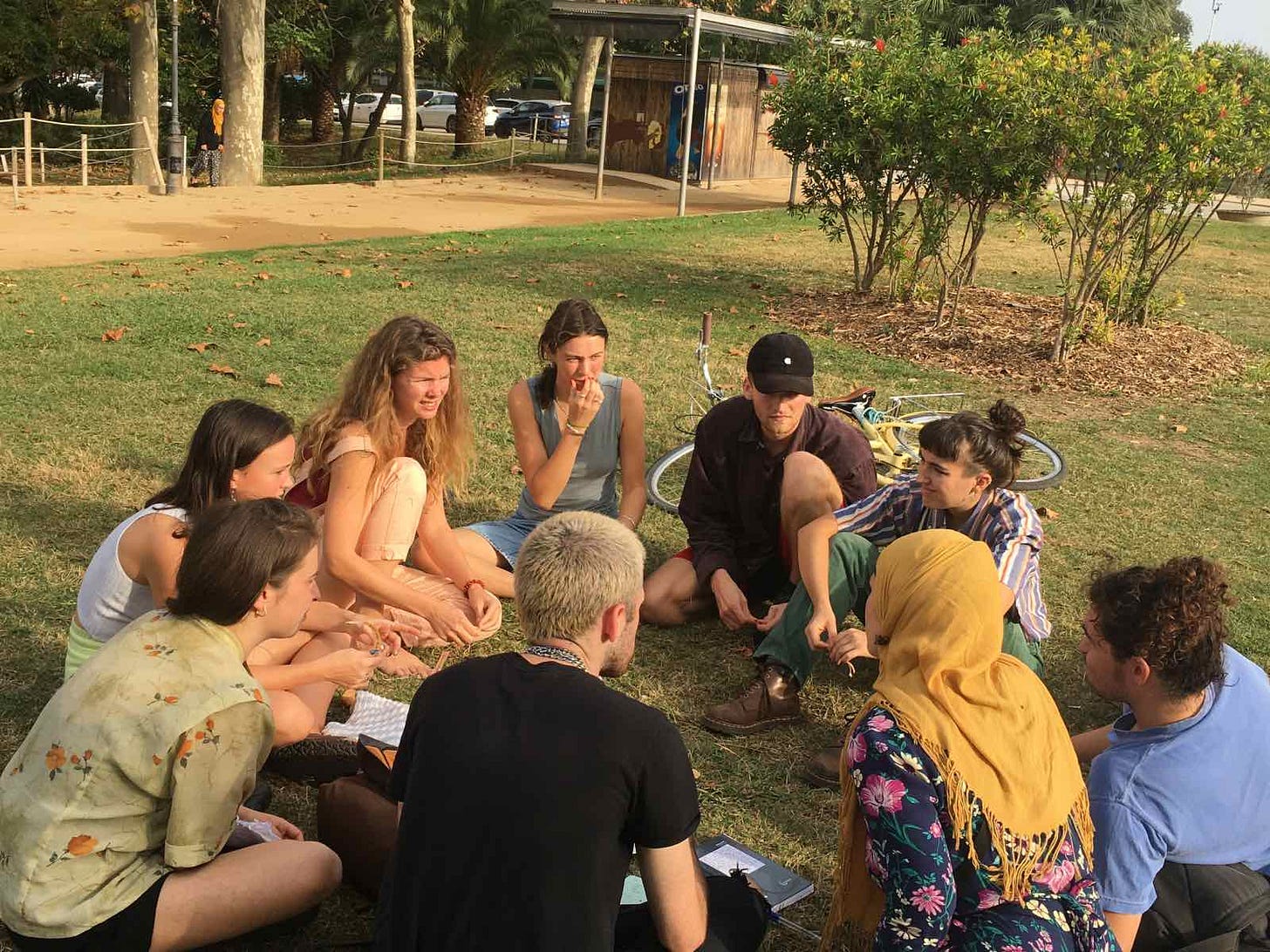How do you pursue a career in degrowth if you need, like, money to live?
Also just in: the EU election results fail to cancel out all the good in the world.
I was walking to my client’s office when suddenly, it seemed hilarious. After a decade of history lessons and years of campaigning, the European right-wing swing still happened exactly as predicted.
History repeats itself because people are still people. Still disenfranchised, frustrated and looking for someone to blame.
It’s not hilarious, of course. There’s just a touch of the absurd in the air, and depression and despair don’t change that. But they’re natural feelings - I saw a student pro-Palestine encampment offering free screaming-into-the-void sessions, and I was tempted.
I was at the Greens/EFA election night watch party. We watched, drinks in hand, while the right gained seats across Europe like some kind of poorly-acted show that keeps being renewed against better judgement. “I’m so scared,” one of my friends messaged from across the room. “About what’s happening in France.”
The political landscape is pretty bleak. At the same time, we tend to live life as if it’s already 2030, 2040, or 2050. We imagine ourselves in the worst case scenarios. If X is in power, then XYZ will probably happen…
But constantly thinking about what might happen is exhausting, and ultimately, changes little about what we do next. It’s alright, beneficial even, to look back for a second at how much good we have achieved and the stunning number of people who tirelessly begin new sustainable initiatives, new NGOs, and new campaigns, with and without political support.
Between Sunday and today, everything has changed, but also very little tangible difference that we can point to or hold. I woke up on Monday in a grey and stormy mood, a brain full of fog and a post-election night exhaustion. An activist had messaged me to invite me to an improv jam. I stared at the invite like it was coming from outer space. The sun was shining, and I was irritated by its audacity.
But that’s the thing. Sunny days come, whether we believe it or not. The far-right gained seats, yes, but most of Europe did not vote for the far-right. Governments are temporary and made up of individuals, not monolith parties.
We’re working for things that will outlast any European Parliament, NGO coalition campaign, or lifetime. Movements have beaten far greater odds than this. Doing good and helping each other doesn’t have a time limit, no matter what happens.
Because we still have a lot, actually. Particularly those of us in places like Brussels and Western Europe with the privilege and resources to speak out for our values. We have our community, our people, our values, the things that matter, the things that no government can take from us.

What’s Going On?
Right-wing gains in EU election results: 5 key takeaways.
Related: Mexico elects a climate scientist as president – but what does this mean?Revealed: repairing Israel’s destruction of Gaza will come at huge climate cost
Related: 5 of the world’s biggest banks trying to greenwash destruction of the Amazon.UN chief urges global fossil-fuel advertising ban.
Related: Misogynistic influencers are promoting climate denial.India heatwave kills at least 33, including election officials.
Related: On the beaches of Gaza and Tel Aviv, two tales of one heatwave.Nearly half of journalists covering climate crisis globally received threats for their work.
Related: Positive environmental journalism from 2024 so far.
If you’d like to support The Green Fix, please consider tipping us a virtual coffee.
Focus On… Careers in Degrowth
Today’s Focus section is a collaboration with Grist, a US-based nonprofit, independent media organization. This article is part of their Looking Forward newsletter, highlighting climate solutions. Claire and I have been following each other’s work for a while now, and we teamed up to bring you this story about the world’s first master’s program in degrowth.

In 2018, one of Spain’s top-ranked universities, which trains its graduates for careers in everything from neuroscience and biomedicine to government and economics, launched a first-of-its-kind master’s program in a more unusual career path: a degree in degrowth.
Degrowth is a movement that calls for intentionally scaling down overdeveloped economies, like those in the U.S. and Europe, focusing instead on citizens’ well-being, ecological sustainability, and providing for basic needs without extracting every last resource.
The idea has been gaining momentum, particularly in Europe where it originated, and its proponents argue it offers the best path to a lifestyle that is compatible with addressing climate change — one that respects the planet’s limits and avoids unnecessary emissions by simply producing and consuming less.
The master’s program, and a separate online master’s in degrowth that was started in 2021, have now seen hundreds of graduates. But what does it mean to train people for a career in disrupting the whole idea of careers? And what happens when graduates of a program designed to reimagine the system have to find their place within that system?
Big questions, but ever since we at Looking Forward and The Green Fix first learned about this unique degree program, we’ve been wanting to find out what it’s really like to study degrowth — and what happens afterwards.
* * *

The university is called the Universitat Autònoma de Barcelona, or Autonomous University of Barcelona, which is a way of saying a university not controlled by the government. And the degree is technically in political ecology, degrowth, and environmental justice. In other words, studying sustainable alternatives to the modern economic system.
The program was originally conceived of by Giorgos Kallis, one of the most prominent researchers and advocates in the degrowth field. Kallis, an academic with a warm and approachable air, describes his research as “un-disciplinary,” in the sense that it has spanned many topics, from droughts and water policies to ecological economics. It was his work on water management that led him to question the paradigm of continuous and necessary growth.
He became a professor at the Autonomous University of Barcelona in 2010 and, along with colleagues at the Research & Degrowth association, launched a summer school program in degrowth. “There were many people who would come for the summer school and they would say, 'we wish there was also a full master's,’” Kallis said. There were also plenty of researchers in the field who were eager to teach.
Students at the program in Barcelona take theoretical classes in degrowth, environmental justice, and alternative economics and governance structures, and also receive practical training in skills like group facilitation, how to run a social justice campaign, and how to set up a cooperative. All backgrounds are welcomed, but the program tends to attract radically-minded students — “at least in terms of the need for transformation in order to confront climate change,” Kallis said. Around two-thirds of the students who attend the in-person program are from Europe. The online program, which is solely focused on theory, tends to reach a more diverse mix.
Kallis and his colleagues also designed the in-person program specifically to prepare students for the job market. It offers career development with three main paths in mind: policy and advocacy work; work in the social and cooperative economy; and research.
“I mean, we don't mind someone working in the private sector and bringing these ideas wherever they want,” he said. But it tends not to attract the kind of person who’s interested in climbing the corporate ladder, so to speak.
* * *

France-based graduate Adélaide Cadioux had been jumping between jobs for years before enrolling in the Barcelona program. “I was feeling very dissatisfied with the way that companies were working. My values were seemingly constantly misaligning with people's needs for profit.” She found the program by pure chance while searching on the university website, and described it as a moment of revelation. “I was like, ‘I need to quit my job and do that master’s’.”
There, she said, “I found people who understand what it feels like to constantly feel like you don't fit in and your values are not represented in whatever job you're going for.” Many of the students there shared her desire to find an alternative to traditional capitalist ways of working. “There's also a form of radical acceptance,” she said. “It's normal that you feel like this. Let's work together on something else.”
Valerie Costa, a recent graduate from the U.S., was similarly burned out after working in the nonprofit and social good sector for around two decades. “I saw this program and I was like, ‘This program's made for me,’” she recalled. “I wasn't even really actively wanting to be a grad student, but I was like, ‘Oh, wow. I could take a year and really think about everything I've been working on, but in a deeper way.’”
Recent Belgian graduate Emilie de Bassompierre had already encountered the concept of degrowth in their previous studies and was looking for a way to put it into practice. “I had teachers who were very keen on studying critiques of capitalism,” they said. “My studies helped me gain an understanding of not only how that system came to be from a historical perspective, but also, if we want alternatives, what are the elements of the system that we have to think of dismantling?”
Post-graduation, Emilie is facing down the reality of balancing their values with their need to pay the rent — and how to make use of having the privilege of being able to prioritise their values for at least a while; a privilege many other students share. “It's already been a few years that I'm aware that whatever I want to do, it's not going to be something that brings me a lot of money,” Emilie said.
Following graduation, they are pursuing an internship in climate justice at a European NGO. After that, they are considering a future in either advocacy or academia. But the most important thing, they said, is that they can pursue a life that makes them happy — and they don’t anticipate working full-time forever.
“Before, I was always looking at what I ‘should’ do or what was the ethical, moral thing to do. But that can lead you to burning out. I think it’s possible to deconstruct the idea that we have to define ourselves through our work,” Emilie said. “I want to have free time for activism and independent projects.”
Adélaide and Valerie are also weighing up where degrowth fits into their future plans. Adélaide is searching for a job. “If something comes along the lines of what I want…I [would] find ways to amp up my activism or give back to the community, where it just feels like a sort of equal relationship between what you take from capitalism and what you give back to your community.”
For Valerie, incorporating degrowth principles and advocacy into her work has been challenging in other ways. She returned to the U.S. after graduating, where the concept is still fairly novel. “I'm not gonna walk down the street with a degrowth flag,” she said. She added that, from a policy perspective, the U.S. lacks the kind of social safety net that is a prerequisite to effective and equitable degrowth. “I'm not going to campaign for austerity,” she said. “What I do want is more livable communities for people. I want people to be more connected with each other. I want better services and supports in place, better housing.”
After completing the program, her activism has remained focused on resistance, with an element of community-building as well. She co-founded a Seattle-based network called Troublemakers that weaves those two things together. “For me, the degrowth program really illuminated the absolute critical importance of community and connection,” she said.
* * *
While he believes that this specialised training in degrowth and political ecology is valuable, and was previously missing from the academic landscape, Giorgos Kallis also recognizes that studying degrowth may be something of a hard sell when job hunting. “Would the ministry contract someone who has studied how to degrow the economy, when no one wants to degrow it?” he pondered.
Still, at least two alumni of the master’s program have gone on to be assistants to members of the European Parliament, Kallis said. Others have organized an annual festival that brings together LGBTQ+ rights with elements of degrowth. And others are working as activists, teachers, nonprofit leaders, and more.
Video: Several MEPs have been pursuing an agenda Beyond Growth in the EU institutions.
Kallis believes that there is value in studying the principles of degrowth whether or not students go on to find their lifelong path in bringing it to fruition. “I want to think that increasingly there will be demand for out-of-the-box thinking,” he said. “And I also want to think that, degrowth or not degrowth, our students are getting good training in fundamental theories, models, ecological economics, political ecology. So even if they don't work on degrowth per se — but they work on some other framework or transition or climate mitigation — they have the skills to be critical and good thinkers.”
For Angela Huston, who like many other graduates of the online program, is mid-career and less willing than the in-person students to spend several years just pondering how to change the system, this was exactly the point.
Angela had been working in public services and international development in Italy for ten years before doing the virtual masters. She said she valued how the program forced her to question the cultural expectations to make money and be financially comfortable. “I was super radical hardcore in my university days,” she said. “And then I think over time I started to conform more with the world. And that's part of the reason I've gone back to degrowth. We need more of this radical thinking that's not trying to align with and appease current systems.”
Given the urgency of the climate crisis and how challenging it is to change the current economic system in the timeframe needed, she is open to working with for-profit companies, to influence their climate transition strategies from inside and mitigate their climate impacts.
Applications for the seventh edition of the Barcelona program are now open. The course was restructured this year based on feedback from students and faculty over the past six years — including things like a stronger focus on activism skills, and a desire to include more intersectional frameworks, like feminism and decolonization.
The coordinators of both the online and in-person courses are currently focused on making the programs more accessible to people from different backgrounds, especially those from outside Europe and the U.S. They are also working to more actively steward the network of alumni, and are looking toward an alumni conference next year.
And as for the graduates who are still trying to figure out what their degrowth studies mean for their path out in the current working world? “I don’t think that it’s because we studied degrowth that now we’re lost,” Emilie de Bassompierre said. “It’s more the opposite. Figuring out how to work towards the world we want to see.”
— Cass Hebron and Claire Elise Thompson. Subscribe to the Looking Forward newsletter for more climate solution stories.
So Now What Do I Do?
LEARN SOMETHING
Join our Substack elections chat- what are your thoughts & feelings after seeing the results?
Cass spoke to Euranet Plus for a podcast episode on whether climate is sliding down the political agenda.
Join The Green Fix and Generation Climate Europe on the 26th June in Brussels for the post-election hangover chillout. Details & RSVP here.
TRY SOMETHING NEW
The Goi Peace Foundation is accepting entries for its essay contest on the theme of ‘overcoming conflict’ until 15 June.
The UN Sustainable Development Goals Awards are open until the 17th June.
Tune into this online webinar on ‘Healing collective trauma through relationships’ on the 18th June at 16h CEST.
CHANGE THE SYSTEM
Check out the Conversation Compass by Friends of the Earth Europe: Winning messages for a socially just and green Europe
The Climate Democracy Accelerator is accepting applications from civil society leaders until 27 June.
UK readers: The VoteClimate tool lets you see how best to vote in your constituency to protect climate action.
The Green Fix is now offering low-cost sponsored slots on the newsletter. Book your slot by emailing wearethegreenfix@gmail.com.
Stay in the loop
You can follow us on Twitter @TheGreenFix, Instagram @thegreenfix_ and LinkedIn. Connect with Cass on Instagram @cass.hebron and LinkedIn Cass J Hebron.






People are afraid of degrowth as they think it means having their rights/things/freedom taken away. Educating people about it, and making them understand that it means the exact opposite, and it easily solves our issues, is paramount.
Is Degrowth carried by the German Green Party? I don't see it, they focus on Green Gtowth.